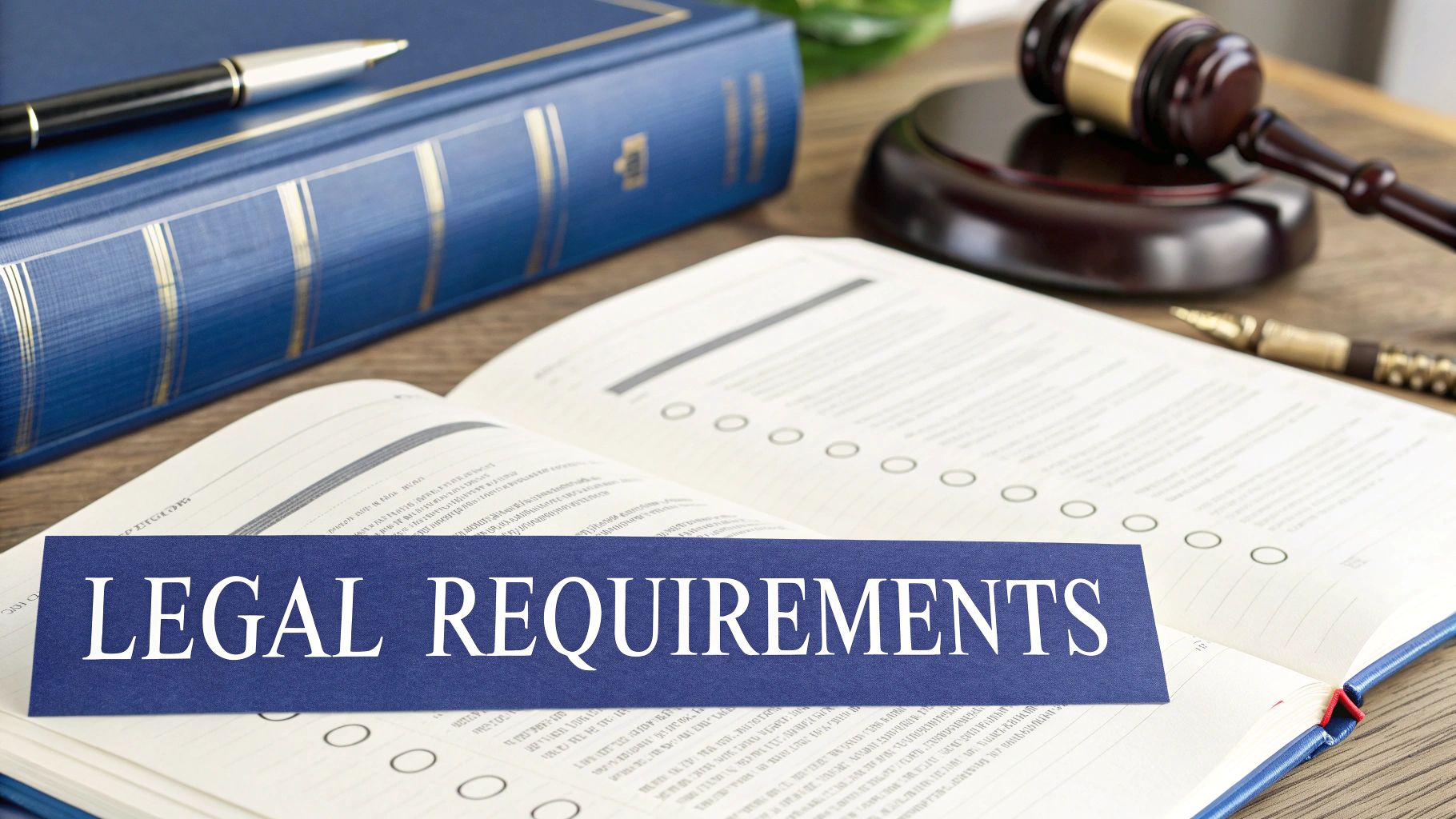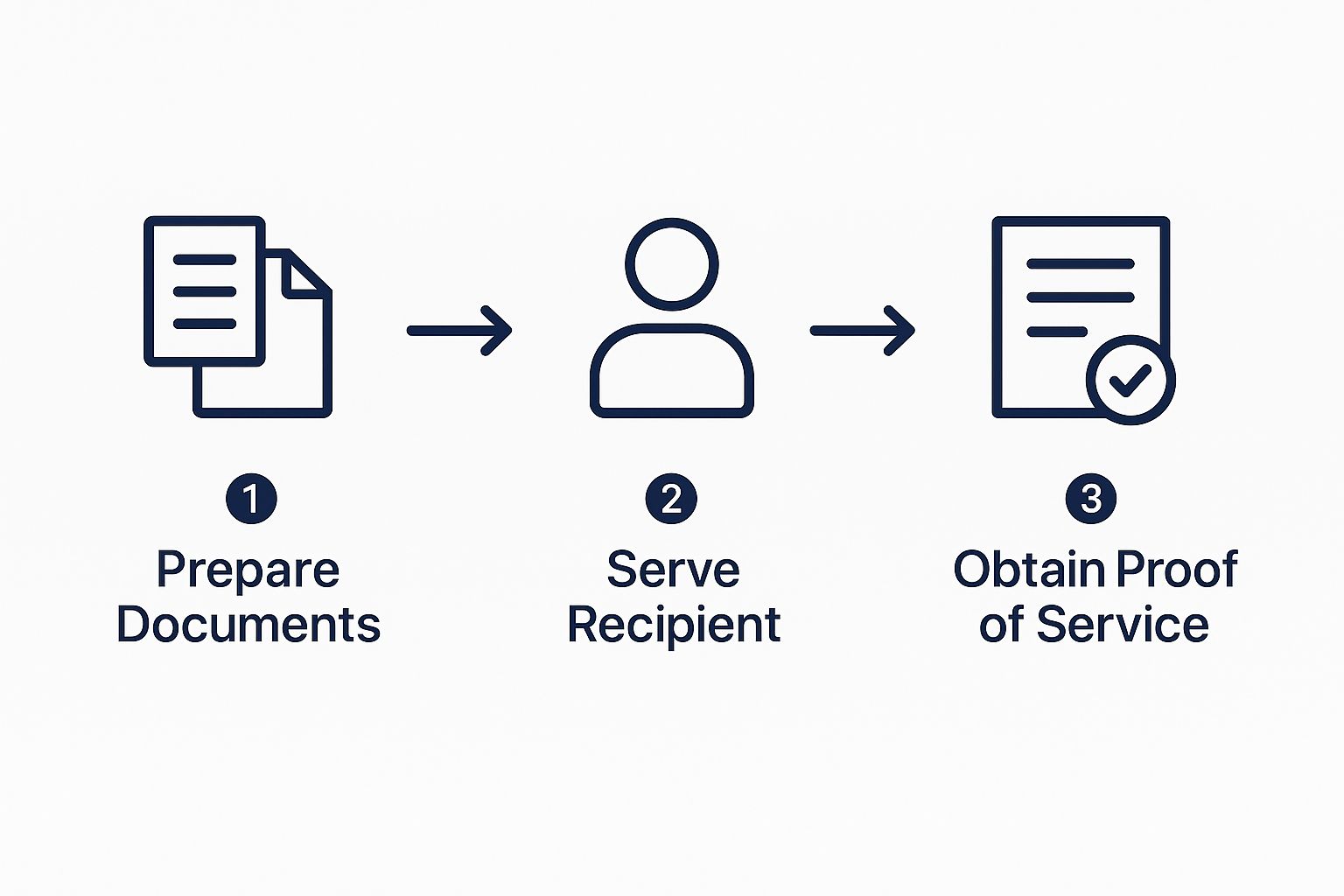Your Guide to Hiring a Process Server UK
- Showix technical Team
- Jul 15, 2025
- 13 min read
Updated: Sep 3, 2025
Ever wondered how crucial legal documents actually get into the right hands? That’s where a process server in the UK comes in. They are a vital cog in the machinery of our justice system, making sure everyone involved in a legal dispute is properly informed, which is fundamental to a fair hearing.
What a UK Process Server Actually Does
It's easy to mistake a process server for just another courier, but that’s not the whole picture. Think of them more as a specialist messenger for the courts. Their main job is to deliver—or 'serve'—legal documents to a person or company involved in a court case. This is much more than just sticking a letter in the post; it’s about providing solid proof that the recipient got the papers, allowing the legal wheels to turn fairly.
This service is a cornerstone of what’s known as 'due process'. For any court case to be just, all parties have to know it's happening. A professional process server ensures this, acting as a neutral third party who can officially confirm that delivery took place. Their work gives solicitors, businesses, and individuals peace of mind that legal notices have been served correctly and ethically.
The Role of a Certified Messenger
Imagine you need to send a message so important that you absolutely must know the intended person received and read it. You wouldn't just drop it in a Royal Mail postbox and cross your fingers, would you? You’d hire a trusted person to hand-deliver it and come back with proof. That's exactly what a process server does within the legal world.
They handle all sorts of sensitive documents, each one kick-starting a critical legal process. Some common examples include:
Divorce Petitions: The papers that formally begin divorce proceedings.
Statutory Demands: A serious, final warning before a company can be wound up for being unable to pay its debts.
Court Orders: Crucial injunctions like non-molestation orders or prohibited steps orders.
Claim Forms: The documents that officially start a civil lawsuit against someone.
At its heart, a process server’s value is in stopping arguments about whether someone received the court papers. By providing a sworn statement or a certificate of service, they cut through any potential disputes and give the court the confidence to move forward, knowing everyone has been properly notified.
An Essential Part of the Legal System
The need for professional process serving isn't going away; it's a constant, reflecting just how important the role is. In fact, market analysis consistently shows that process serving is essential for keeping legal systems running smoothly by ensuring parties are correctly notified of legal actions. The ongoing demand for reliable servers cements their place in the UK's justice system, both for court-mandated actions and private legal matters.
This foundation of trust is precisely why a process server in the UK is, and will remain, indispensable for a fair and functioning justice system.
The Rules for Serving Legal Documents in the UK

Handing over legal papers isn't as simple as dropping off a letter. It’s a formal, tightly regulated process designed to be fair and legally sound. In England and Wales, the playbook for this is the Civil Procedure Rules (CPR), which essentially acts as the court's official instruction manual.
The core of these regulations, CPR Part 6, spells out exactly what counts as legally valid 'service'. Getting this wrong isn't just a minor mistake; it can have huge consequences for a case. If documents aren't served by the book, a case could be delayed for months or even thrown out of court entirely.
Why so strict? It's all about fairness. These rules guarantee that nobody can later claim they never knew about the legal proceedings against them, giving everyone a proper chance to respond.
Approved Methods of Service
The CPR lays out a few different ways to serve documents, and a seasoned process server in the UK knows precisely which method fits the situation and the type of document. The goal is to be practical while making sure everything is legally watertight.
Here are the main methods allowed:
Personal Service: This is the gold standard. The documents are physically handed to the person. It's the most direct route and provides undeniable proof they received them.
Postal Service: Documents can be sent via first-class post to the person's usual or last known address.
Leaving at a Specified Place: This means delivering the papers to an approved address, like the individual's home or a company's main office, often by putting them through the letterbox.
Electronic Methods: With the court's green light, service can sometimes be done by email or another digital channel, but usually only if the recipient has agreed to it beforehand.
The right method often depends on the document itself. High-stakes papers like certain court orders or bankruptcy petitions absolutely must be served in person. This is where professional expertise really shines, especially when dealing with people actively trying to avoid being served. If you’re curious about how professionals navigate these tricky situations, you can learn more about how private investigators help solve complex cases.
The Importance of Proof
Following the rules is one thing, but proving you did it is just as important. After successfully serving the documents, a process server drafts a formal statement that records exactly how, when, and where it all happened.
This document, usually called a Certificate of Service or Statement of Service, isn’t just a simple delivery note. It's a sworn legal statement that stands as official court evidence, confirming the rules were followed to the letter.
This proof is absolutely crucial. Recent figures show there were around 14,000 defended case trials in a single quarter—a 16% jump from the previous year. This rise in court activity underscores the growing need for fast, provable document delivery to keep the wheels of justice turning. Without that solid proof of service, the entire legal process can grind to a halt.
How Much Does a Process Server Cost in the UK?

Let's talk money. It's one of the first things anyone wants to know when they need to hire a professional, and rightly so. Understanding the costs involved helps you budget properly and see the real value you’re getting. The good news is that with process serving, the pricing is usually refreshingly straightforward.
Most professional process servers in the UK work on a fixed-fee basis. This is a huge benefit for you. It means you know the total cost right from the start, with no nasty surprises or hourly rates racking up in the background. This single fee is designed to cover the entire job, from the moment you hand over the papers to the final proof of service.
Essentially, you're paying for a complete, end-to-end service. The fee typically includes the agent's time to review the case, their travel, and a number of visits to the address. Once the documents are successfully served, it also covers the crucial step of preparing the proof of service for the court.
What's Included in a Typical Fixed Fee?
When you hire a process server, you're not just paying for someone to knock on a door. You're investing in expertise, persistence, and legal compliance. A fixed fee is structured to give the agent the best possible chance of getting the job done correctly, taking all the hassle and uncertainty off your plate.
So, what can you expect for your money? The industry standard for serving court documents in the UK usually falls between £150 and £200. For this fee, you’ll almost always get up to three separate visits to the service address. This approach is key, as some UK process servers find their first visit is successful as often as 80% of the time. Those extra visits are what ensure the job gets finished for the trickier cases.
This table breaks down what you're typically paying for:
Service Component | Description | Typical Inclusion |
|---|---|---|
Initial Case Review | The agent assesses the documents and the provided information. | Yes |
Travel Time & Costs | Travel to and from the service address within a standard area. | Yes |
Attendance Attempts | Usually up to three separate visits at different times of the day. | Yes |
Communication | Keeping you updated on the progress of the service. | Yes |
Proof of Service | Preparing a Statement or Certificate of Service for the court. | Yes |
Postage & Admin | Sending you the original proof of service document. | Yes |
As you can see, the fee covers a lot more than just a single delivery attempt. It’s a comprehensive package built around persistence, professionalism, and providing the final, court-ready evidence you need.
Factors That Can Affect the Price
While the fixed-fee model covers the vast majority of cases, some situations are more complex and might adjust the final price. It's always best to be upfront about any unusual circumstances so you can get an accurate quote.
Here are a few common things that can push the cost up:
Urgency: If you need documents served the same day or within 24 hours, expect to pay a premium. This bumps your case to the top of the queue.
Remote Locations: Serving papers in a hard-to-reach place, like the Scottish Highlands or a very rural part of Wales, will likely involve extra travel fees.
International Service: Getting documents served abroad is a completely different ball game. It’s a specialist task that involves international treaties and will always be quoted on a case-by-case basis.
It helps to see these costs as part of the bigger picture. Process serving is often just one piece of a larger legal puzzle. For a bit more context on how different professional services are priced, you might find our guide on how much a private investigator costs in the UK useful.
At the end of the day, clear and transparent pricing gives you peace of mind. You're not just paying a fee; you're making a sound investment in professional service and legal certainty for your case.
A Look Inside a Typical Process Serving Job
So, what actually happens when you hand over a stack of legal papers to a process server? It’s not just a simple delivery run. The whole process is a careful mix of planning, persistence, and, most importantly, precise record-keeping. Let's break down what a typical job looks like, from the moment you get in touch to when you receive that crucial proof of service.
It all starts when a client, usually a solicitor or a company, sends over the documents and the relevant details. This isn't just a case of "here you go, deliver this." A good process server will first get to grips with the documents to understand exactly what they are and if any specific service rules apply. They'll also analyse the information on the recipient – their address, maybe a work schedule, or any known habits that could make finding them a bit easier.
Planning and First Attempts
Once they have all the info, the process server starts to build a plan. They don't just jump in the car and hope for the best. They map out the most efficient route and, more critically, think about the best times to make a visit. This could mean an early morning call before the person heads to work, an evening visit, or even popping by over the weekend.
Let's imagine they need to serve a claim form to someone at their home. A professional approach might look something like this:
First Visit (Weekday Morning): The server might arrive at 7:30 am, aiming to catch the person before they start their day. If there’s no answer, they’ll make a note of any signs of life – a car in the drive, lights on – without being intrusive.
Second Visit (Weekday Evening): A few days later, they'll try again, but this time around 7:00 pm. By varying the time, they increase the odds of finding the person at home.
Third Visit (Weekend): If the first two visits draw a blank, a final attempt could be scheduled for a Saturday afternoon. This shows the court that every reasonable effort was made to serve the papers personally.
This three-visit strategy is pretty standard. It’s a persistent but always professional way of getting the job done. This visual guide gives a great overview of how the whole process fits together.

As the infographic shows, it’s a structured sequence of events. Each step builds on the last to ensure the final result is legally solid.
The Service and Final Reporting
Eventually, during one of these visits, the server makes contact. They'll confirm the person's identity, often by simply asking them their name, and then serve them the documents. The server’s manner is always professional; their job is to deliver the papers, not to get into a debate or argument. They just state what the documents are and leave it at that.
The final step is probably the most important part of the entire process. The server will then prepare a sworn Statement of Service or a Certificate of Service. This is the official court document that confirms who was served, with what, when, and where. It’s the evidence you need.
This report is sent back to you, the client, and the job is complete. It’s this methodical work behind the scenes that makes a professional process server in the UK such a vital part of the legal system. They turn a simple instruction into undeniable proof for the court.
How to Choose a Reputable Process Server
Let’s be honest, not all process servers are cut from the same cloth. When your legal case is on the line, picking the right person for the job is a huge decision. It's about far more than just finding the cheapest quote. A genuinely professional process server is an expert in their field, bringing credibility and a solid grasp of the legal system to every instruction.
Choosing a professional is a bit like hiring any other specialist. You wouldn't hire an uncertified electrician to rewire your house, and the same principle applies here. Their qualifications and track record matter. The right choice guarantees your documents are served not just fast, but in a way that’s legally sound, saving your case from frustrating delays or, even worse, being thrown out on a technicality.
Key Indicators of a Professional Service
So, what should you look for? When you're vetting a potential process server, there are a few non-negotiable things you need to see. These are the tell-tale signs of a business that takes its work seriously.
Here's a quick checklist of what to confirm:
Deep Knowledge of the Civil Procedure Rules (CPR): This is the big one. They absolutely must be experts in CPR Part 6. Don’t be afraid to ask them a few "what if" questions to see how they'd handle tricky situations. Their answers will quickly show you if they know what makes a service legally valid.
Full Professional Indemnity Insurance: This is your safety net. It protects you and your case if a mistake happens, however unlikely. Any true professional will have this cover and won't hesitate to show you their certificate.
ICO Registration: Any business handling personal data in the UK must be registered with the Information Commissioner's Office (ICO). It's a clear sign they are committed to data protection and GDPR.
Membership in Professional Bodies: While it isn't a legal requirement, membership in a recognised industry association is a very good sign. It usually means they've signed up to a code of conduct and are serious about their professional standards.
These aren't just bureaucratic boxes to tick; they're fundamental. They prove you're dealing with someone competent and credible. For more advice on vetting specialist services, our expert UK guide on how to hire a private investigator has some great related tips that you might find useful.
Questions to Ask Before You Hire
Once you've covered the basics, it's time to dig a bit deeper. A few specific questions can tell you a lot about how they work and, crucially, how they communicate with their clients.
Before you make a final decision, ask about their success rates. How do they keep you updated on progress? What does their final report or statement look like? A transparent, professional server will have ready answers, giving you the confidence you need to proceed.
Don't be shy about asking for details. If you get a vague or woolly answer, that’s often a red flag. On the other hand, a confident and detailed response shows you're talking to an experienced professional who gets how important accountability is. By asking the right questions, you can make sure the process server UK you choose is a genuine asset to your case.
Your Questions About UK Process Servers Answered

When you're dealing with legal matters, the last thing you need is more confusion. Getting documents served correctly is a critical step, and it’s natural to have questions about how it all works. This section cuts through the jargon to give you straight answers about hiring a process server in the UK, so you can feel confident you're making the right choice.
Let's clear up some of the common uncertainties. Understanding the rules, the process, and the real benefits will help make the whole experience a lot less stressful.
Can a Process Server Force Their Way into a Property?
No, absolutely not. A process server has no more legal right to force their way into a home or business than the postman does. Their job is to deliver documents according to the law, and that's it.
They have to respect property rights and can't use force, threats, or intimidation. Their power comes from professionalism and persistence, not brute force.
If someone refuses to open the door, the server simply makes a note of the attempt and leaves. They’ll then try again at a different time or, if the situation calls for it, explore other legally sound methods to complete the service.
What if the Person Is Avoiding Service or Cannot Be Found?
This is where a good process server really earns their fee. It's a classic problem: the person you need to serve seems to have vanished or is actively dodging every attempt. This is precisely when a professional’s expertise shines.
They don't just give up. Instead, they start building a detailed record of every single attempt. This log will include the exact date, time, and what they observed on each visit.
This detailed report, often turned into a sworn statement or affidavit, becomes vital evidence. With this proof of evasion, you can go to court and ask for 'substituted service'. This is a court order that lets you serve the documents in a different way—perhaps by email, post, or even a message on social media if it can be proven the person will see it.
Essentially, it stops someone from grinding the legal process to a halt just by refusing to answer their door.
Is a Process Server Better Than Using Royal Mail?
While sending documents by post is fine for some things, it falls short when you need absolute legal certainty. The two services are built for entirely different levels of proof.
Think about it: a Royal Mail receipt proves you sent an envelope. It doesn’t prove who opened it, or if it was even opened at all. A process server, on the other hand, provides a sworn statement of service that confirms the documents were handed to the right person, at a specific time and place. That’s powerful evidence in court.
On top of that, many court documents like injunctions or bankruptcy petitions legally must be served in person. Using a process server in the UK ensures you meet these strict rules, especially when dealing with someone who might try to claim they never received a thing. It dramatically boosts your chances of success.
What Areas Do UK Process Servers Cover?
Most established process serving firms have agents stationed all over the country. This means you can get documents served practically anywhere in the United Kingdom, whether it's England, Wales, Scotland, or Northern Ireland.
It doesn’t matter if the person is in a busy hub like London or a quiet village in the Highlands. A good agency will have a local agent on the ground, ready to go.
Using a local agent is also just smarter. They know the area, which helps them work quickly and efficiently, saving you money on travel time and costs. This nationwide coverage means you get a consistent, reliable service no matter where the case leads.
For professional and reliable process serving across the UK, you need an experienced team you can trust. Sentry Private Investigators Ltd offers discreet and effective services to ensure your legal documents are served correctly and with full legal compliance. Visit us at https://www.sentryprivateinvestigators.co.uk/uk-process-serving to learn how we can support your legal needs today.





Comments